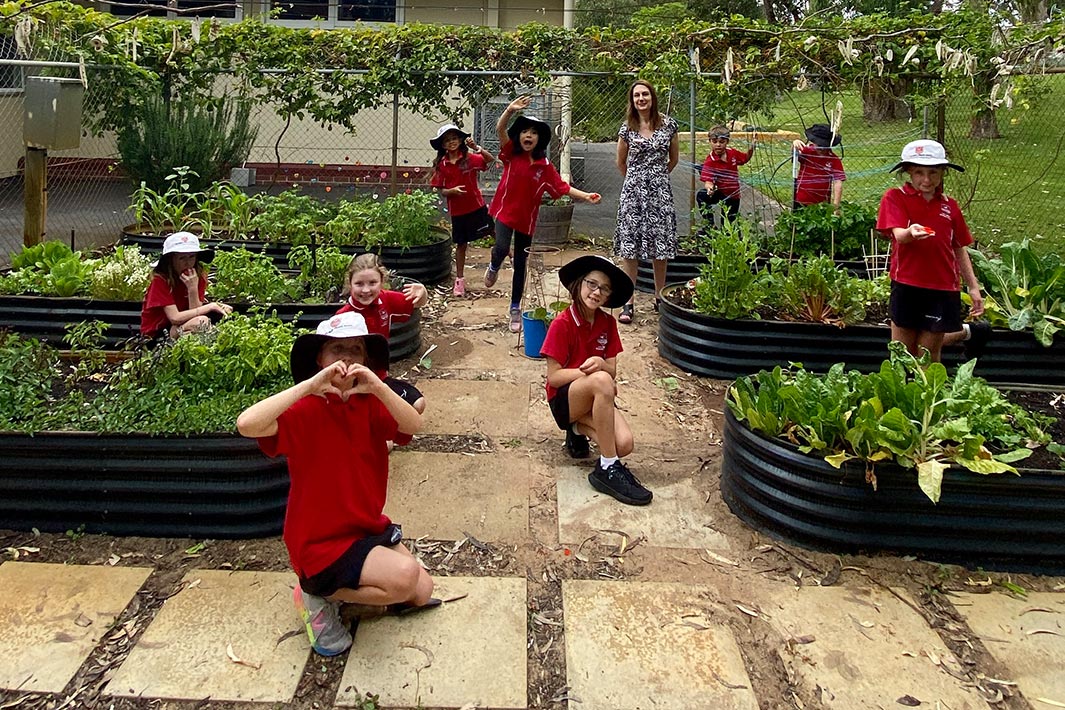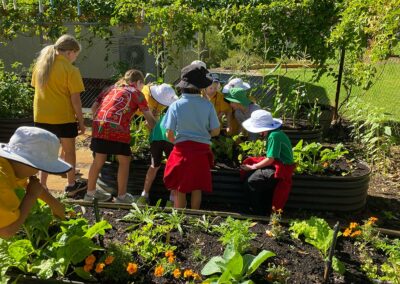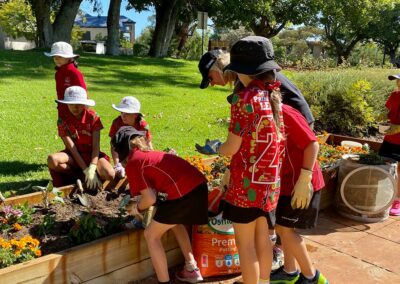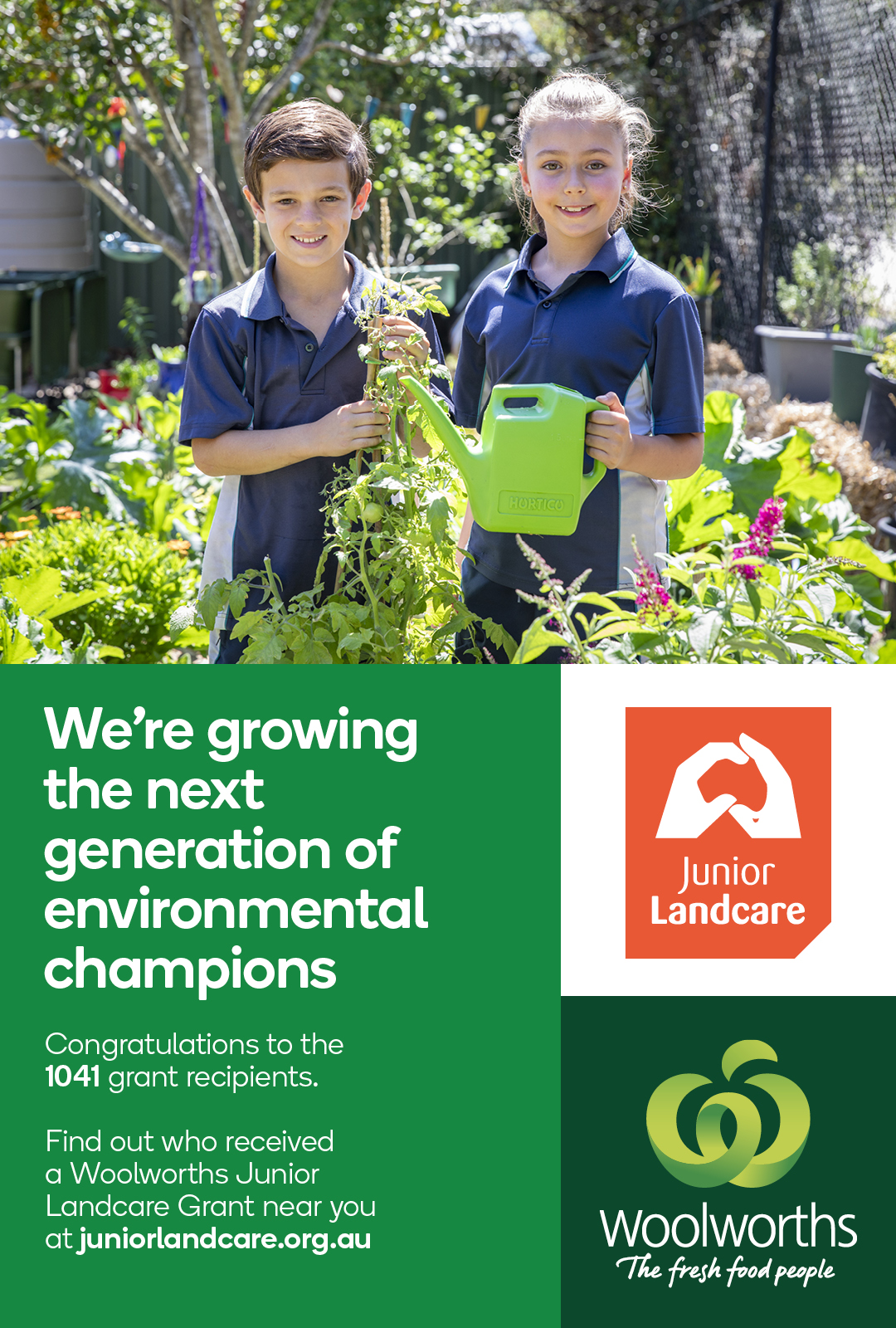CASE STUDY

Age Groups: 7-13
Grant Name: 2022 Woolworths Junior Landcare Grants
School: City Beach Primary School
Grant Sponsor: Woolworths
Project Overview
City Beach Primary School’s ‘Healthy Hearts, Bodies and Minds’ project set about reviving the school’s existing garden space and involved students in sustainable practices to grow herbs, fruits, vegetables and bush tucker to create an inviting, multi-sensory garden the whole school community can now enjoy.
The students had a great sense of ownership of the project, choosing which herbs, vegetables, fruit and bush tucker to grow. They loved planting and labelling the plants and enjoyed watching them grow, noticing the changes over time. They were very proud of their efforts and brought their parents to the school garden to show them what they had achieved.
Educational Outcomes
Through the ‘Healthy Hearts, Bodies and Minds’ project, the students learned about sustainability through recycling, reusing water and using food scraps to make compost. They also learned about propagation by collecting and planting seeds from the garden's produce, including sunflowers, tomatoes, broad beans, and snow peas. Students were also able to see first-hand the different stages of plant development, from seed to harvested produce.
By helping to design the layout of the garden space, such as where to put the garden bench and the pots, and using a phone app to identify plants, the students also extended their design and technology skills.
Two Year 6 students offered to be Gardening Club Monitors, working in small groups with the younger students. Gardening club members developed social skills by working together, taking turns with the tools and sharing ideas.
The students also learned to be safe in the garden by carrying, using and storing the tools correctly, wearing gloves and washing produce before they ate it. The students were also eager to eat the fresh produce, which helped them develop healthy eating habits.
Thanks to the school’s art specialist teacher, who was keen to support the garden project, a variety of student artworks were displayed in and around the garden. The school is now investigating using the produce from the garden in the art lessons, in techniques such as dying and weaving.
The bush tucker plants encouraged discussions about Indigenous culture.
Environmental Outcomes
As part of the ‘Healthy Hearts, Bodies and Minds’ project, students researched companion planting and planted marigolds, basil and sage in the garden beds, as well as lavender and rosemary around the garden's edge, to attract beneficial insects and deter unwanted pests.
Using the Education Department's Edible School Garden Planting and Maintenance Guide to find out when to plant their seeds and seedlings, the school was able to have things flowering or being ready to harvest at different times of the year.
Climbing plants such as jasmine, sweet peas, snow peas and a native vine along the garden fence were also planted – and when established, these will act as natural shade for the garden.
To encourage good waste management and sustainability practices, the school repurposed pots, stones and tools donated by parents and community members. When the students washed their hands or the produce, they collected the wastewater in buckets; this water was emptied into the watering cans and used to water the garden. Students also collected food scraps from the produce and along with their lunch scraps, added them to the school's compost bins. When the compost is ready, it will be used to improve the soil quality in the garden.
Conclusion
The students were engaged in every stage of the process, with the project bringing children from different year levels together “to make this happen,” as one student said. By creating opportunities for connections and co-operation across the year levels, the school says it has noticed a definite improvement in the social and emotional wellbeing of its students.
The students particularly enjoyed looking for produce they could pick, harvest and eat. “Seeing the plants grow and change so quickly. It's like magic,' shared another student. They loved looking for worms and ladybirds too, which were attracted by the plants they chose to create their beneficial garden.
The younger students loved the fairy garden and hunting for the fairies hidden among the plants, and the garden bench that was repurposed for the garden was a definite favourite, with students racing to the space to be first to sit on it.
The project has also allowed the school to create a calming and nurturing space, with the school chaplain now using the garden during 1:1 sessions with students who require emotional support.


 Teachers & Educators
Teachers & Educators Youth or Community Groups
Youth or Community Groups